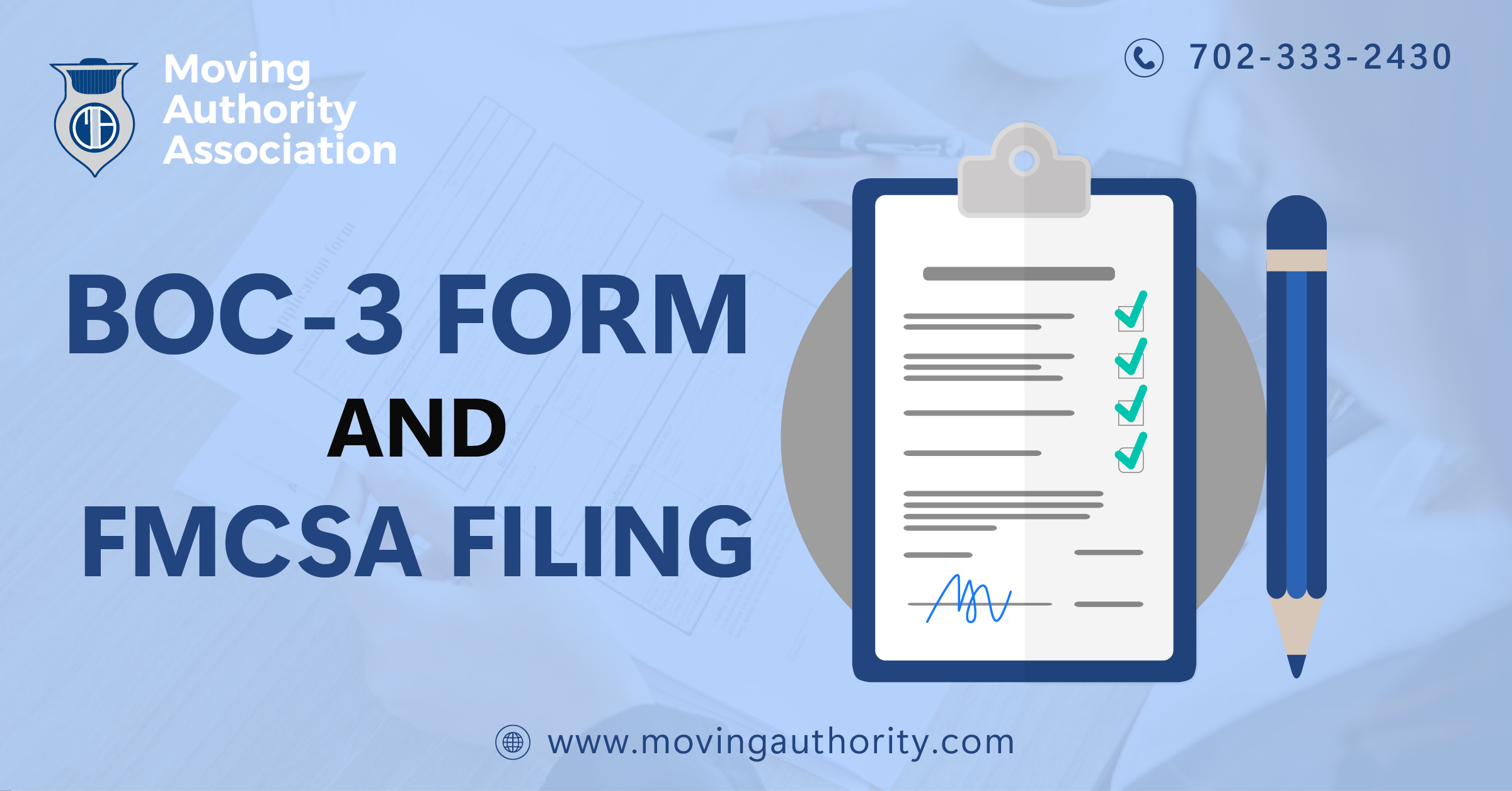
BOC-3 for And FMCSA Filing
The Federal Motor Carrier Safety Administration (FMCSA) requires trucking companies to comply with a range of regulations to ensure safety and accountability. One of these requirements is the filing of a BOC-3 form. The BOC-3 is a legal document that designates process agents for the trucking company, who will accept legal and regulatory documents on their behalf in any state where they operate. In this article, we will provide an overview of the FMCSA filing requirements for BOC-3, including who needs to file, what information is required, and how to maintain compliance.
BOC-3 Process Agents
Process agents are individuals or companies designated by motor carriers and brokers to accept legal documents and other important communications on their behalf. Learn more about Starting a Trucking Company. These agents act as a point of contact between the carrier/broker and the state or federal government, as well as other entities involved in legal proceedings.
Process agents play a crucial role in BOC-3 filing as they act as the point of contact for receiving legal documents on behalf of the registered trucking company. They are responsible for receiving legal documents such as court summons, subpoenas, and other important notices that require the attention of the trucking company. Learn more about DOT Number Deactivation. The role of process agents is to ensure that these legal documents are delivered promptly and efficiently to the appropriate parties within the trucking company. Process agents also help ensure that the trucking company complies with federal regulations related to the transportation industry.
To become a process agent for BOC-3 filing, specific requirements must be met. The process agent must have a physical address in each state where they will serve as an agent, and they must be available during normal business hours to accept legal documents on behalf of their clients. Additionally, they must be registered with the Federal Motor Carrier Safety Administration (FMCSA) and have a valid Designation of Process Agent form on file with the agency. Do you want to know Dot Authority? Some states may have additional requirements for process agents, so it is important to research and comply with all relevant regulations.
Filing BOC-3
Filing a BOC-3 is a requirement for all motor carriers operating in interstate commerce in the United States. To file a BOC-3, you must provide certain documents required by the Federal Motor Carrier Safety Administration (FMCSA). Learn more about Biennial Update. These documents include your company's name, address, contact information, and information about your process agents. You must also provide your USDOT and MC numbers, which the FMCSA assigns. Read more about the Broker Freight Package. These numbers help the FMCSA identify your company and ensure that you are in compliance with federal regulations. Ensuring that all required documents are submitted accurately and on time is essential to avoid penalties or fines.
BOC-3 Compliance
BOC-3 compliance is essential for trucking companies that operate interstate. To ensure compliance, trucking companies must first understand the filing options available to them. The BOC-3 form can be filed electronically through the FMCSA website or by mail. Once the form is submitted, it is essential to maintain compliance by renewing the BOC-3 registration as required by the FMCSA. Do you want to know Broker Mover Package information? Failure to comply with BOC-3 registration and renewal requirements can result in penalties and even the suspension or revocation of a company's operating authority. Trucking companies must stay up-to-date on their BOC-3 compliance to avoid negative consequences.
Benefits of BOC-3 Compliance
Maintaining BOC-3 compliance comes with several benefits for trucking companies. Firstly, it helps avoid penalties and fines resulting from non-compliance. These penalties can be significant and may even result in suspending or revoking a company's operating authority, which can be devastating for their business. Do you want to know the CA Number? By staying compliant with BOC-3 regulations, trucking companies can avoid these negative consequences and ensure their business continues operating smoothly.
Another benefit of BOC-3 compliance is that it helps companies maintain good standing with regulatory agencies. Know what is a Carrier Agreement. This is important as it demonstrates to these agencies that a company is committed to following the rules and regulations that govern the trucking industry. This can be especially important when seeking permits, licenses, or other regulatory approvals, as agencies will likely approve applications from companies with a compliance history.
Finally, maintaining BOC-3 compliance can help protect a company's reputation. Non-compliance can lead to negative publicity and can damage the public's perception of a company. By staying compliant, companies can demonstrate their commitment to ethical and legal business practices, which can enhance their reputation and help them attract new customers.
Conclusion
To recap, the BOC-3 filing is crucial for trucking companies operating across state lines. It involves designating process agents who can receive legal documents on behalf of the company. By complying with BOC-3 requirements, trucking companies can avoid penalties and fines, maintain good standing with regulatory agencies, and protect their business and reputation.
It is essential to understand the requirements for BOC-3 compliance and work with reputable process agents and regulatory experts to ensure proper filing and maintenance. Read more about the Claims Package. Regularly reviewing and updating compliance requirements and maintaining accurate records and documentation can also help trucking companies stay compliant.
In conclusion, BOC-3 compliance is critical to operating a successful trucking business. By understanding the requirements and taking the necessary steps to comply, trucking companies can avoid potential consequences and maintain a positive reputation in the industry.





